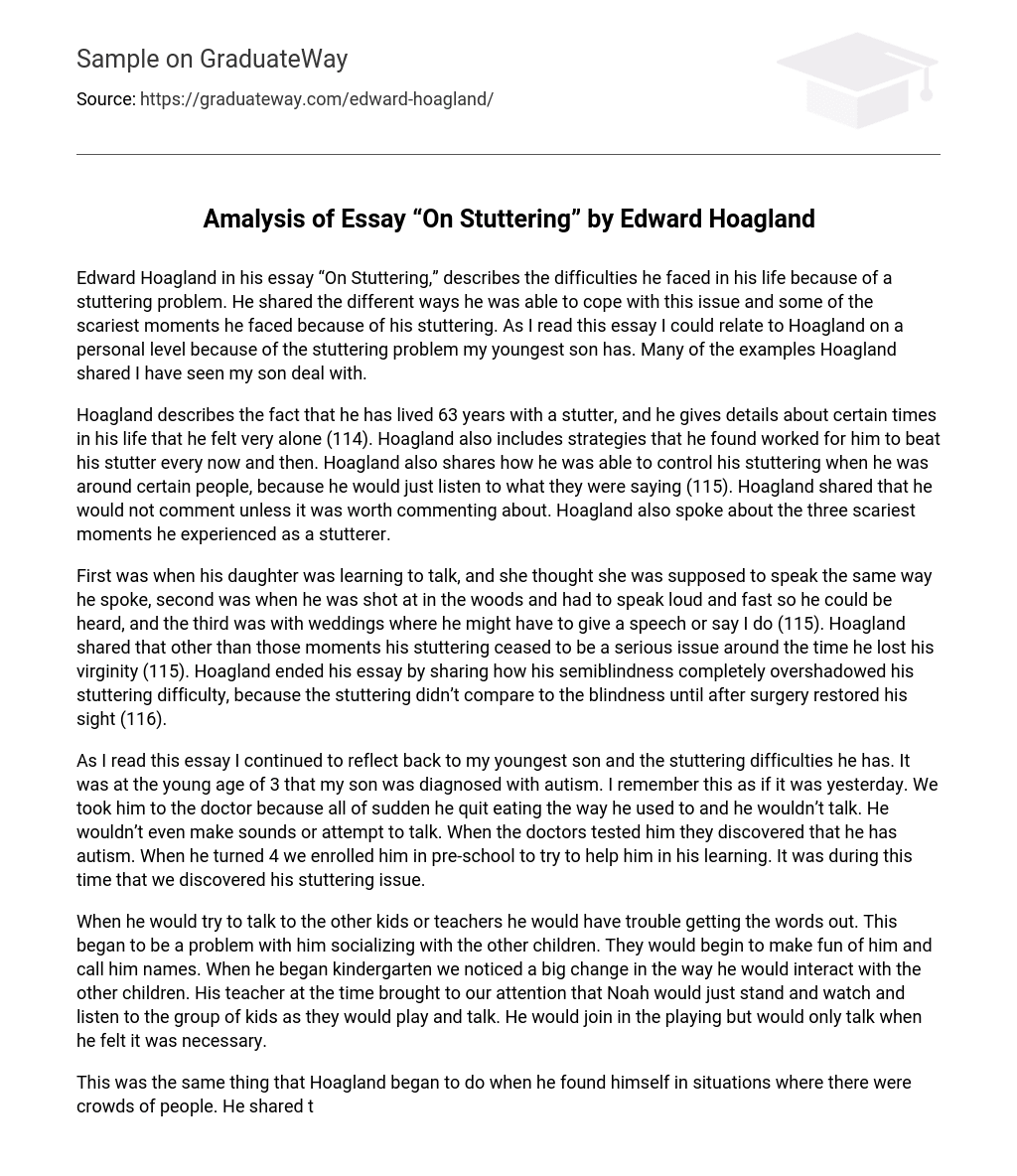Edward Hoagland in his essay “On Stuttering,” describes the difficulties he faced in his life because of a stuttering problem. He shared the different ways he was able to cope with this issue and some of the scariest moments he faced because of his stuttering. As I read this essay I could relate to Hoagland on a personal level because of the stuttering problem my youngest son has. Many of the examples Hoagland shared I have seen my son deal with.
Hoagland describes the fact that he has lived 63 years with a stutter, and he gives details about certain times in his life that he felt very alone (114). Hoagland also includes strategies that he found worked for him to beat his stutter every now and then. Hoagland also shares how he was able to control his stuttering when he was around certain people, because he would just listen to what they were saying (115). Hoagland shared that he would not comment unless it was worth commenting about. Hoagland also spoke about the three scariest moments he experienced as a stutterer.
First was when his daughter was learning to talk, and she thought she was supposed to speak the same way he spoke, second was when he was shot at in the woods and had to speak loud and fast so he could be heard, and the third was with weddings where he might have to give a speech or say I do (115). Hoagland shared that other than those moments his stuttering ceased to be a serious issue around the time he lost his virginity (115). Hoagland ended his essay by sharing how his semiblindness completely overshadowed his stuttering difficulty, because the stuttering didn’t compare to the blindness until after surgery restored his sight (116).
As I read this essay I continued to reflect back to my youngest son and the stuttering difficulties he has. It was at the young age of 3 that my son was diagnosed with autism. I remember this as if it was yesterday. We took him to the doctor because all of sudden he quit eating the way he used to and he wouldn’t talk. He wouldn’t even make sounds or attempt to talk. When the doctors tested him they discovered that he has autism. When he turned 4 we enrolled him in pre-school to try to help him in his learning. It was during this time that we discovered his stuttering issue.
When he would try to talk to the other kids or teachers he would have trouble getting the words out. This began to be a problem with him socializing with the other children. They would begin to make fun of him and call him names. When he began kindergarten we noticed a big change in the way he would interact with the other children. His teacher at the time brought to our attention that Noah would just stand and watch and listen to the group of kids as they would play and talk. He would join in the playing but would only talk when he felt it was necessary.
This was the same thing that Hoagland began to do when he found himself in situations where there were crowds of people. He shared that even if he knew more about the subject than the people who were talking about it he would just listen until the right moment to speak up (115). Just as Hoagland shared in his essay there were times he felt very alone because of his stuttering, we have had our son tell us the same thing. Once when we were on a boy-scout camping trip he came to me and asked if he could just stay with me instead of hanging with the other boys.
I asked why and he said because they wouldn’t acknowledge him and they were pretending that he didn’t exist. As a dad this broke my heart and I began to do everything I could to help him. There was second time when we were on vacation and my son had to yell for help. We were staying at a hotel in California and we went swimming. When we got to the pool there were a couple of younger kids there without their parents. After swimming a while my wife and got out and were sitting on some chair when my son hollered out that there was a kid drowning in the pool.
He told my wife and me later on that he was so scared that he didn’t know if he would be able to get the words out because of his stuttering but he knew he had to try. This is similar to the example of Hoagland shared about when he was hunting in the woods and he was shot at by mistake and how he had to make himself heard loud and fast so they knew he was there (115). As time has gone by his stuttering has become less noticeable and he seems to be able to keep it somewhat in check.
He told me just the other day that he has learned to slow himself down when he wants to talk and share what’s on his mind. In the essay “On Stuttering,” Hoagland shared what he went through in his life as he dealt with this speech impairment. As he shared the things he experienced I relived the things my own son has dealt with because of his speech impairment. But this essay, which I had my son read, gives us encouragement to continue to grow and not let the things we have difficulty with keep us from accomplishing our lives dreams and hopes.





